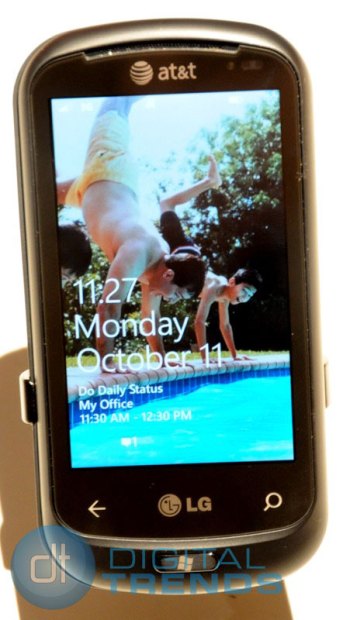 Make sure to check out five reasons Windows Phone 7 will succeed for an alternate perspective on Microsoft’s new operating system!
Make sure to check out five reasons Windows Phone 7 will succeed for an alternate perspective on Microsoft’s new operating system!
Microsoft is about to re-enter the smartphone war with its latest arsenal: Windows Phone 7. Those who’ve seen it in action will concede it’s more than a slight upgrade over Windows Mobile 6.5 – rather, it’s a complete redesign that bears little resemblance to its predecessors.
And let’s face it: the Redmond, Wash. software giant needs to do something drastic to get back in this fight. Microsoft’s smartphone market share rests at just 5 percent (with its Windows Mobile 6.5 or earlier operating system), down from 9 percent this time last year, according to Gartner. By comparison, RIM’s BlackBerry dominates at 18 percent market share, Google’s Android at 17 percent and Apple’s iPhone with 14 percent.
But in a category experiencing enormous growth – nearly 270 million smartphones are expected to be sold this year alone, up a whopping 56 percent from 2009 – there is certainly room for Microsoft to win back the hearts, and wallets, of consumers and businesses alike.
“With Windows Phone 7, we focused on two key things: ‘always delightful’ and ‘wonderfully mine,” said Microsoft’s CEO Steve Ballmer, while on stage in New York City this month to officially unveil the first-generation Windows Phone 7 devices. “We wanted it to be delightful across a range of different devices, and across a range of applications and experiences, whether you’re looking for a place to eat, reading mail, catching up with friends or making a phone call.”
“And we want you to make it yours – it’s all about your photos, your e-mail, your friends,” adds Ballmer.
Even with Windows Phone 7’s strengths, it’s not going to be a cakewalk for Microsoft. Here’s why.
It’s too late
While smartphones are a relatively young category, and Microsoft is likely seeing this battle as a marathon instead of a sprint, it could be argued those who want a smartphone today have already invested in one — be it BlackBerry, iPhone or Android phone – and have also begun to buy dedicated software (e.g. apps) and hardware (such as docking stations or car kits), which makes them less likely to give up on their existing phone. Microsoft might pull out before the platform catches on as it did with the now-defunct KIN phone that debuted this past spring. Microsoft has also tried to take on Apple’s iconic iPod with its Zune players, and has failed at making a dent in this space against the juggernaut.
 The app gap
The app gap
Where at the apps? How many will there be? How much? These are important questions Microsoft doesn’t seem to have an answer to — evident at the Windows Phone 7 and AT&T launch event in October. By comparison, Apple’s App Store has more than 250,000 apps (many of which are very affordable), Android Market is now at nearly 140,000 apps (says Samsung) and BlackBerry’s App World has hit the 10,000 app milestone. With little to download when Windows Phone 7 launches, many might shy away from Microsoft’s scarce app marketplace in favor of the other players and their thriving online stores.
No copy and paste
A standard feature with the other major players is missing from Windows Phone 7: “copy and paste” is not supported on these smartphones. Well, not yet anyway, though Microsoft’s Joe Belfiore, corporate vice president and director of Windows Phone program management, assured users would be able to copy and paste via a software update in early 2011. Smartphone shoppers who do their homework, though, might feel this is another strike against Windows Phone 7 – until this feature is added and in the timeframe promised by Microsoft. If you think about how much you copy and paste in your existing smartphone, it might be difficult to fathom a phone without this key feature
Microsoft’s stigma
Microsoft needs a brand refresh. The Windows Vista debacle might be behind it, but this misstep came at a time when competitors were slamming them in slick marketing ads and stable products (Apple), better online services (Google) and open-source software (such as OpenOffice) began to catch on as legitimate alternatives to pricey software (Microsoft Office). What’s more, the younger generation might write off Microsoft as “your dad’s computer” instead of the more culturally cool Mac. How will Microsoft win over the future users of smartphones?
Rough edges
Early buzz on the Windows Phone 7 smartphones is quite positive for the most part – including first-look reviews of the HTC Surround and Samsung Focus (both with AT&T) — but there are some common issues found in a few reviews. One is limited support for landscape view (most hubs prefer you work vertically) and another is Xbox Live games that prove sluggish to load. Another beef: there is no front-facing camera for video chats, which is available in many other smartphones, including iPhone 4 and Samsung Galaxy S.
Do the “pros” of Windows Phone 7 far outweigh the “cons”? Is Microsoft bringing smartphones to the next level or is it a case of too little, too late? The verdict is still out for the platform’s critical and commercial success, but one thing’s for certain: it’s going to be an interesting – and highly competitive – 2011 or the major smartphone players.
Read: Five reasons Windows Phone 7 will succeed for an alternate perspective on Microsoft’s new operating system!
Editors' Recommendations
- iPhone SE deals: Refurbished 2nd and 3rd Gen iPhones
- You can pick up the Google Pixel 7 Pro for only $500 today
- Best iPhone deals: Save on iPhone 15, iPhone 15 Pro Max and more
- This Android phone is a surprisingly great buy at $100
- The 5 best ring lights for phones in 2024


